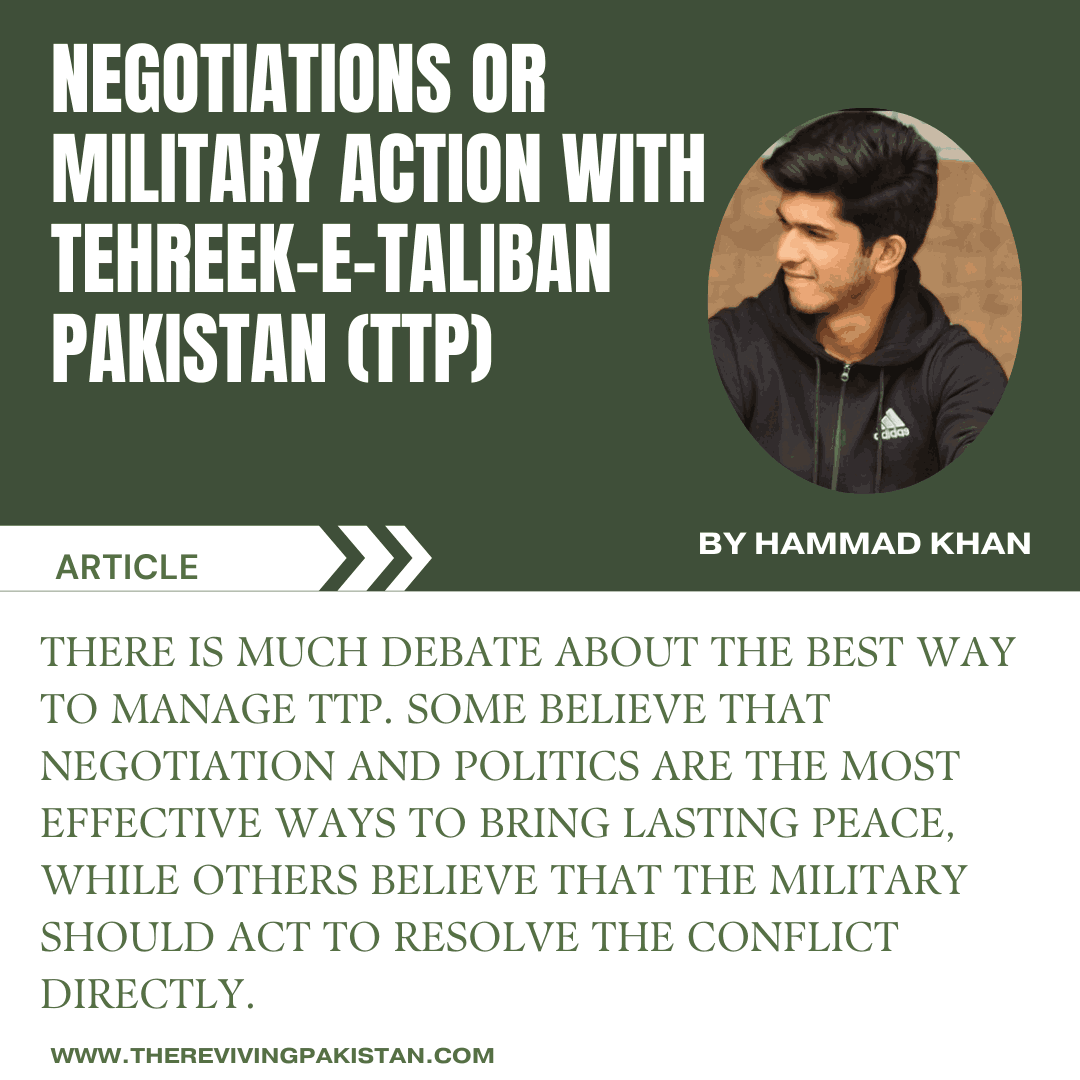About the Author(s)

Hammad Khan
Author is a student of BS International Relatins (IR). His academic journey is marked by a keen interest in comparative politics and public policy and diplomacy.
There is much debate about the best way to manage TTP. Some believe that negotiation and politics are the most effective ways to bring lasting peace, while others believe that the military should act to resolve the conflict directly. To determine the most effective method, it is important to first check the track record of TTP.
Track Record of TTP:
The TTP is the first aggressive organization in Pakistan, to oppose the Government. Its Impact and control have developed altogether since the Taliban’s takeover of Afghanistan. The TTP rose after the US attack on Afghanistan in 2001, at first, pointing to setting up an Islamic political framework in Pakistan based on Sharia law. Discontent with Pakistan’s government support of the US activities drove the TTP formal foundation in 2007.
Early on, TTP supported the Afghanistan Taliban. Over time, they moved the center only to operations inside Pakistan,minimizing their territorial and worldwide exercise to avoid worldwide backlash. Initially, From 2014 to 2018, Pakistani military offensives, drone strikes, and internal conflict caused the TTP to be debilitated. Nevertheless, their control started to bounce back. After the peace agreement between the US and Afghan Taliban in 2020, the TTP escalated their exercises, especially after the Taliban seized control of Kabul in 2021.
Risk Assessment
To gauge the danger caused by TTP, it is important to consider its authentic setting, the development of its bolster among jihadists, and the advancement of its strategies. They also reexamined their strategies to target the Pakistani military strengths, or civilians, to address feedback from other jihadist bunches like al-Qaeda. Government Response and Impact of the Taliban Takeover. The Pakistani military has countered TTP through military campaigns and collaboration with the US, rambling operations focusing on TTP authority. Despite these efforts, the TTP changed hands and maintained a strong position between Afghanistan and Pakistan. Efforts were made to prepare, but with little success, and no progress was made in the ongoing war.
The rise of the Taliban in Afghanistan supported the TTP, and TTP prisoners were released and given job opportunities. The TTP sees the Afghanistan Taliban’s triumph as a motivating example for their claim to be guerrillas against Pakistan. The Afghan Taliban sees TTP as an internal issue for Pakistan to be addressed. However, the group has been involved in severe acts of terrorism including the infamous Attack on the Army Public School (2014). Karachi Airport Attack (2014). Attack on Bacha Khan University Charsadda (2016). General Headquarter Attack Rawalpindi (2009). Badaber Airbase Attack Peshawar (2015).These are one of the deadliest attacks in Pakistani history.
CONCERN ABOUT NEGOTIATIONS WITH TTP:
Perception of weaknesses.
People might perceive engaging in negotiations with TTP as a sign of weakness, and it could result in increased demands or increased violence if the group perceives it has leverage over the government. Both the public and the group might perceive further negotiations with the TTP and other terrorist extremist groups as a sign of weakness. This perception can erode the government’s authority and credibility, suggesting that the state is not strong enough to confront terrorism through its means.
Previous Experiences.
Past attempts to negotiate with the TTP have often failed, resulting in a temporary ceasefire followed by renewed violence.
2012-2013 ceasefire.
Pronounced a ceasefire amid peace talks with the Pakistani government. In early 2013, they continued assaults, counting, focusing on military establishments, and checkpoints.
2014 ceasefire.
In February 2014, the Pakistani government and the TTP declared a ceasefire. Despite this, TTP proceeded with assaults, including bombing and ambushes, leading to the collapse of the truce.
2015 ceasefire.
Attempts to stop the war happened again in 2015, but it did not last. The TTP launched new attacks, including an attack on an army vehicle in the Khyber Pukhton Khwa.
2020-2021 ceasefire.
With peace talks supported by the Afghan government, the TTP agreed to a temporary ceasefire. They continued to attack Pakistani security forces and civilian targets, undermining the peace process. This model suggests that negotiations may not lead to lasting peace and instead provide the TTP with an opportunity to reorganize, and strengthen its network. This could lead to increased terrorist activity by the TTP and other groups encouraged by their success. The TTP’s criminal history of ceasefire violations and continued violence undermines prospects for successful negotiations.
Set a precedent.
If the TTP succeeds in negotiating with the government, this will set a bad precedent. Encouraging other extremist groups to do the same, they say that violence and terrorism are effective means of forcing governments into negotiations and possible participation.
Countries may not be ready to enforce their laws. Negotiations usually occur when the other party is confident that they can achieve their goals as well.
Legitimizing Terrorism
The Tehreek-e-Taliban Pakistan lacks legitimacy and public support and is therefore unable to engage in political dialogue. Unlike other insurgents who may have clear political goals and enjoy the support of local communities, the Pakistani Taliban is the main terrorist group
responsible for large-scale violence and sectarian violence. Negotiations could give the Pakistani Taliban formal legitimacy as political actors, giving them a platform and recognition they would otherwise lack. It would endanger the country’s reputation if the Tehreek-e-Taliban Pakistan a terrorist organization gained political legitimacy. Even if the negotiation with Tehreek-e-Taliban Pakistan succeeded there may be more splinter groups that reject talks. These separate groups can perpetuate or escalate violence, seriously undermining security. which is in a military context.
Need for Military Action.
As negotiations have failed, again and again, military operations are vital to terrorism. Evidence from past conflicts shows that the TTP used the negotiation period as an opportunity for reorganizing and power-building rather than a genuine desire for peace. We need a strategy to get to the root of the problem of terrorism by winning the hearts and minds of people. Ensuring the internal stability of the country the US government has requested $101 million to help
Pakistan promote democracy, terrorism and economic stability. According to US Deputy Secretary of State Donald Lu, this funding will support economic reforms, debt management, counter-terrorism initiatives, etc.
Recommendations:
Instead of directly tackling TTP, it should focus on Afghanistan. This is because Regional security depends on political stability and cooperation in Afghanistan. This serious problem of terrorism that knows no boundaries, including TTP and other extremist groups, will be handled by involving the Afghan government. The tehreek-e -Taliban Pakistan has historical and operational ties with Afghanistan, so Pakistan may indirectly exert pressure on them by dealing with their Afghan counterparts.
Thus, a situation can emerge whereby an enabling government in Kabul prevents movements of TTP inside its territories and supports networks for these people.
Engaging with Afghanistan could attract international support because many countries consider regional stability a mutual concern. This will make it difficult to secure external backing, thus strengthening Pakistan’s position and efforts globally against terrorism.

